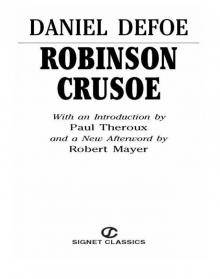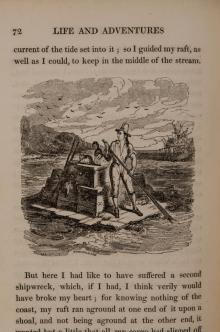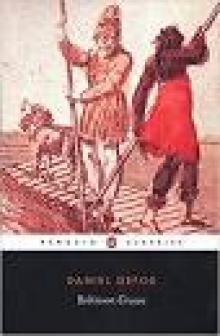- Home
- Daniel Defoe
An Essay Upon Projects Page 3
An Essay Upon Projects Read online
Page 3
little, in forcing the reader to repeat some of the worst of our
vulgar imprecations, in reading my thoughts against it; to which,
however, I have this to reply:
First, I did not find it easy to express what I mean without putting
down the very words--at least, not so as to be very intelligible.
Secondly, why should words repeated only to expose the vice, taint
the reader more than a sermon preached against lewdness should the
assembly?--for of necessity it leads the hearer to the thoughts of
the fact. But the morality of every action lies in the end; and if
the reader by ill-use renders himself guilty of the fact in reading,
which I designed to expose by writing, the fault is his, not mine.
I have endeavoured everywhere in this book to be as concise as
possible, except where calculations obliged me to be particular; and
having avoided impertinence in the book, I would avoid it too, in
the preface, and therefore shall break off with subscribing myself,
Sir,
Your most obliged, humble servant
D. F.
AUTHOR'S INTRODUCTION.
Necessity, which is allowed to be the mother of invention, has so
violently agitated the wits of men at this time that it seems not at
all improper, by way of distinction, to call it the Projecting Age.
For though in times of war and public confusions the like humour of
invention has seemed to stir, yet, without being partial to the
present, it is, I think, no injury to say the past ages have never
come up to the degree of projecting and inventing, as it refers to
matters of negotiation and methods of civil polity, which we see
this age arrived to.
Nor is it a hard matter to assign probable causes of the perfection
in this modern art. I am not of their melancholy opinion who
ascribe it to the general poverty of the nation, since I believe it
is easy to prove the nation itself, taking it as one general stock,
is not at all diminished or impoverished by this long, this
chargeable war, but, on the contrary, was never richer since it was
inhabited.
Nor am I absolutely of the opinion that we are so happy as to be
wiser in this age than our forefathers; though at the same time I
must own some parts of knowledge in science as well as art have
received improvements in this age altogether concealed from the
former.
The art of war, which I take to be the highest perfection of human
knowledge, is a sufficient proof of what I say, especially in
conducting armies and in offensive engines. Witness the now ways of
rallies, fougades, entrenchments, attacks, lodgments, and a long et
cetera of new inventions which want names, practised in sieges and
encampments; witness the new forts of bombs and unheard-of mortars,
of seven to ten ton weight, with which our fleets, standing two or
three miles off at sea, can imitate God Almighty Himself and rain
fire and brimstone out of heaven, as it were, upon towns built on
the firm land; witness also our new-invented child of hell, the
machine which carries thunder, lightning, and earthquakes in its
bowels, and tears up the most impregnable fortification.
But if I would search for a cause from whence it comes to pass that
this age swarms with such a multitude of projectors more than usual,
who--besides the innumerable conceptions, which die in the bringing
forth, and (like abortions of the brain) only come into the air and
dissolve--do really every day produce new contrivances, engines, and
projects to get money, never before thought of; if, I say, I would
examine whence this comes to pass, it must be thus:
The losses and depredations which this war brought with it at first
were exceeding many, suffered chiefly by the ill-conduct of
merchants themselves, who did not apprehend the danger to be really
what it was: for before our Admiralty could possibly settle
convoys, cruisers, and stations for men-of-war all over the world,
the French covered the sea with their privateers and took an
incredible number of our ships. I have heard the loss computed, by
those who pretended they were able to guess, at above fifteen
millions of pounds sterling, in ships and goods, in the first two or
three years of the war--a sum which, if put into French, would make
such a rumbling sound of great numbers as would fright a weak
accountant out of his belief, being no less than one hundred and
ninety millions of livres. The weight of this loss fell chiefly on
the trading part of the nation, and, amongst them, on the merchants;
and amongst them, again, upon the most refined capacities, as the
insurers, &c. And an incredible number of the best merchants in the
kingdom sunk under the load, as may appear a little by a Bill which
once passed the House of Commons for the relief of merchant-
insurers, who had suffered by the war with France. If a great many
fell, much greater were the number of those who felt a sensible ebb
of their fortunes, and with difficulty bore up under the loss of
great part of their estates. These, prompted by necessity, rack
their wits for new contrivances, new inventions, new trades, stocks,
projects, and anything to retrieve the desperate credit of their
fortunes. That this is probable to be the cause will appear further
thus. France (though I do not believe all the great outcries we
make of their misery and distress--if one-half of which be true,
they are certainly the best subjects in the world) yet without
question has felt its share of the losses and damages of the war;
but the poverty there falling chiefly on the poorer sort of people,
they have not been so fruitful in inventions and practices of this
nature, their genius being quite of another strain. As for the
gentry and more capable sort, the first thing a Frenchman flies to
in his distress is the army; and he seldom comes back from thence to
get an estate by painful industry, but either has his brains knocked
out or makes his fortune there.
If industry be in any business rewarded with success it is in the
merchandising part of the world, who indeed may more truly be said
to live by their wits than any people whatsoever. All foreign
negotiation, though to some it is a plain road by the help of
custom, yet is in its beginning all project, contrivance, and
invention. Every new voyage the merchant contrives is a project;
and ships are sent from port to port, as markets and merchandises
differ, by the help of strange and universal intelligence--wherein
some are so exquisite, so swift, and so exact, that a merchant
sitting at home in his counting-house at once converses with all
parts of the known world. This and travel make a true-bred merchant
the most intelligent man in the world, and consequently the most
capable, when urged by necessity, to contrive new ways to live. And
from hence, I humbly conceive, may very properly be derived the
projects, so much the subject of the present discourse. And to this
sort of men it is easy to trace the original of banks, stocks,
> stock-jobbing, assurances, friendly societies, lotteries, and the
like.
To this may be added the long annual inquiry in the House of Commons
for ways and means, which has been a particular movement to set all
the heads of the nation at work; and I appeal, with submission, to
the gentlemen of that honourable House, if the greatest part of all
the ways and means out of the common road of land taxes, polls, and
the like, have not been handed to them from the merchant, and in a
great measure paid by them too.
However, I offer this but as an essay at the original of this
prevailing humour of the people; and as it is probable, so it is
also possible to be otherwise, which I submit to future
demonstration.
Of the several ways this faculty of projecting have exerted itself,
and of the various methods, as the genius of the authors has
inclined, I have been a diligent observer and, in most, an
unconcerned spectator, and perhaps have some advantage from thence
more easily to discover the faux pas of the actors. If I have given
an essay towards anything new, or made discovery to advantage of any
contrivance now on foot, all men are at the liberty to make use of
the improvement; if any fraud is discovered, as now practised, it is
without any particular reflection upon parties or persons.
Projects of the nature I treat about are doubtless in general of
public advantage, as they tend to improvement of trade, and
employment of the poor, and the circulation and increase of the
public stock of the kingdom; but this is supposed of such as are
built on the honest basis of ingenuity and improvement, in which,
though I will allow the author to aim primarily at his own
advantage, yet with the circumstances of public benefit added.
Wherefore it is necessary to distinguish among the projects of the
present times between the honest and the dishonest.
There are, and that too many, fair pretences of fine discoveries,
new inventions, engines, and I know not what, which--being advanced
in notion, and talked up to great things to be performed when such
and such sums of money shall be advanced, and such and such engines
are made--have raised the fancies of credulous people to such a
height that, merely on the shadow of expectation, they have formed
companies, chose committees, appointed officers, shares, and books,
raised great stocks, and cried up an empty notion to that degree
that people have been betrayed to part with their money for shares
in a new nothing; and when the inventors have carried on the jest
till they have sold all their own interest, they leave the cloud to
vanish of itself, and the poor purchasers to quarrel with one
another, and go to law about settlements, transferrings, and some
bone or other thrown among them by the subtlety of the author to lay
the blame of the miscarriage upon themselves. Thus the shares at
first begin to fall by degrees, and happy is he that sells in time;
till, like brass money, it will go at last for nothing at all. So
have I seen shares in joint-stocks, patents, engines, and
undertakings, blown up by the air of great words, and the name of
some man of credit concerned, to 100 pounds for a five-hundredth
part or share (some more), and at last dwindle away till it has been
stock-jobbed down to 10 pounds, 12 pounds, 9 pounds, 8 pounds a
share, and at last no buyer (that is, in short, the fine new word
for nothing-worth), and many families ruined by the purchase. If I
should name linen manufactures, saltpetre-works, copper mines,
diving engines, dipping, and the like, for instances of this, I
should, I believe, do no wrong to truth, or to some persons too
visibly guilty.
I might go on upon this subject to expose the frauds and tricks of
stock-jobbers, engineers, patentees, committees, with those Exchange
mountebanks we very properly call brokers, but I have not gaul
enough for such a work; but as a general rule of caution to those
who would not be tricked out of their estates by such pretenders to
new inventions, let them observe that all such people who may be
suspected of design have assuredly this in their proposal: your
money to the author must go before the experiment. And here I could
give a very diverting history of a patent-monger whose cully was
nobody but myself, but I refer it to another occasion.
But this is no reason why invention upon honest foundations and to
fair purposes should not be encouraged; no, nor why the author of
any such fair contrivances should not reap the harvest of his own
ingenuity. Our Acts of Parliament for granting patents to first
inventors for fourteen years is a sufficient acknowledgment of the
due regard which ought to be had to such as find out anything which
may be of public advantage; new discoveries in trade, in arts and
mysteries, of manufacturing goods, or improvement of land, are
without question of as great benefit as any discoveries made in the
works of nature by all the academies and royal societies in the
world.
There is, it is true, a great difference between new inventions and
projects, between improvement of manufactures or lands (which tend
to the immediate benefit of the public, and employing of the poor),
and projects framed by subtle heads with a sort of a deceptio visus
and legerdemain, to bring people to run needless and unusual
hazards: I grant it, and give a due preference to the first. And
yet success has so sanctified some of those other sorts of projects
that it would be a kind of blasphemy against fortune to disallow
them. Witness Sir William Phips's voyage to the wreck; it was a
mere project; a lottery of a hundred thousand to one odds; a hazard
which, if it had failed, everybody would have been ashamed to have
owned themselves concerned in; a voyage that would have been as much
ridiculed as Don Quixote's adventure upon the windmill. Bless us!
that folks should go three thousand miles to angle in the open sea
for pieces of eight! Why, they would have made ballads of it, and
the merchants would have said of every unlikely adventure, "It, was
like Phips's wreck-voyage." But it had success, and who reflects
upon the project?
"Nothing's so partial as the laws of fate,
Erecting blockheads to suppress the great.
Sir Francis Drake the Spanish plate-fleet won;
He had been a pirate if he had got none.
Sir Walter Raleigh strove, but missed the plate,
And therefore died a traitor to the State.
Endeavour bears a value more or less,
Just as 'tis recommended by success:
The lucky coxcomb ev'ry man will prize,
And prosp'rous actions always pass for wise."
However, this sort of projects comes under no reflection as to their
honesty, save that there is a kind of honesty a man owes to himself
and to his family that prohibits him throwing away his estate in
impracticable, improbable adventures; but still some hit, even of
the most unlikely, of which this was one o
f Sir William Phips, who
brought home a cargo of silver of near 200,000 pounds sterling, in
pieces of eight, fished up out of the open sea, remote from any
shore, from an old Spanish ship which had been sunk above forty
years.
THE HISTORY OF PROJECTS.
When I speak of writing a History of Projects, I do not mean either
of the introduction of, or continuing, necessary inventions, or the
improvement of arts and sciences before known, but a short account
of projects and projecting, as the word is allowed in the general
acceptation at this present time; and I need not go far back for the
original of the practice.
Invention of arts, with engines and handicraft instruments for their
improvement, requires a chronology as far back as the eldest son of
Adam, and has to this day afforded some new discovery in every age.
The building of the Ark by Noah, so far as you will allow it a human
work, was the first project I read of; and, no question, seemed so
ridiculous to the graver heads of that wise, though wicked, age that
poor Noah was sufficiently bantered for it: and, had he not been
set on work by a very peculiar direction from heaven, the good old
man would certainly have been laughed out of it as a most senseless
ridiculous project.
The building of Babel was a right project; for indeed the true
definition of a project, according to modern acceptation, is, as is
said before, a vast undertaking, too big to be managed, and
therefore likely enough to come to nothing. And yet, as great as
they are, it is certainly true of them all, even as the projectors
propose: that, according to the old tale, if so many eggs are
hatched, there will be so many chickens, and those chickens may lay
so many eggs more, and those eggs produce so many chickens more, and
so on. Thus it was most certainly true that if the people of the
Old World could have built a house up to heaven, they should never
be drowned again on earth, and they only had forgot to measure the
height; that is, as in other projects, it only miscarried, or else
it would have succeeded.
And yet, when all is done, that very building, and the incredible
height it was carried, is a demonstration of the vast knowledge of
that infant age of the world, who had no advantage of the
experiments or invention of any before themselves.
"Thus when our fathers, touched with guilt,
That huge stupendous staircase built;
We mock, indeed, the fruitless enterprise
(For fruitless actions seldom pass for wise),
But were the mighty ruins left, they'd show
To what degree that untaught age did know."
I believe a very diverting account might be given of this, but I
shall not attempt it. Some are apt to say with Solomon, "No new
thing happens under the sun; but what is, has been:" yet I make no
question but some considerable discovery has been made in these
latter ages, and inventions of human origin produced, which the
world was ever without before, either in whole or in part; and I
refer only to two cardinal points, the use of the loadstone at sea,
and the use of gunpowder and guns: both which, as to the inventing
part, I believe the world owes as absolutely to those particular
ages as it does the working in brass and iron to Tubal Cain, or the
inventing of music to Jubal, his brother. As to engines and
instruments for handicraftsmen, this age, I daresay, can show such
as never were so much as thought of, much less imitated before; for
I do not call that a real invention which has something before done
like it--I account that more properly an improvement. For
handicraft instruments, I know none owes more to true genuine
contrivance, without borrowing from any former use, than a mechanic
engine contrived in our time called a knitting-frame, which, built
with admirable symmetry, works really with a very happy success, and
may be observed by the curious to have a more than ordinary

 Captain Singleton
Captain Singleton An Essay Upon Projects
An Essay Upon Projects Moll Flanders Moll Flanders Moll Flanders
Moll Flanders Moll Flanders Moll Flanders The Further Adventures of Robinson Crusoe
The Further Adventures of Robinson Crusoe Everybody's Business Is Nobody's Business
Everybody's Business Is Nobody's Business Robinson Crusoe
Robinson Crusoe The Storm
The Storm The King of Pirates
The King of Pirates History of the Plague in London
History of the Plague in London Memoirs of a Cavalier
Memoirs of a Cavalier_preview.jpg) The Life and Most Surprising Adventures of Robinson Crusoe, of York, Mariner (1801)
The Life and Most Surprising Adventures of Robinson Crusoe, of York, Mariner (1801) A Journal of the Plague Year
A Journal of the Plague Year_preview.jpg) The Life and Adventures of Robinson Crusoe (1808)
The Life and Adventures of Robinson Crusoe (1808) A General History of the Pyrates: / from their first rise and settlement in the island of Providence, to the present time
A General History of the Pyrates: / from their first rise and settlement in the island of Providence, to the present time The Fortunes and Misfortunes of the Famous Moll Flanders
The Fortunes and Misfortunes of the Famous Moll Flanders_preview.jpg) The Fortunate Mistress (Parts 1 and 2)
The Fortunate Mistress (Parts 1 and 2) Robinson Crusoe — in Words of One Syllable
Robinson Crusoe — in Words of One Syllable From London to Land's End
From London to Land's End A New Voyage Round the World by a Course Never Sailed Before
A New Voyage Round the World by a Course Never Sailed Before Roxana
Roxana The Life and Adventures of Robinson Crusoe of York, Mariner, Volume 1
The Life and Adventures of Robinson Crusoe of York, Mariner, Volume 1_preview.jpg) Memoirs of Major Alexander Ramkins (1718)
Memoirs of Major Alexander Ramkins (1718) Dickory Cronke
Dickory Cronke Robinson Crusoe (Penguin ed.)
Robinson Crusoe (Penguin ed.) Moll Flanders
Moll Flanders The Further Adventures of Robinson Crusoe rc-2
The Further Adventures of Robinson Crusoe rc-2